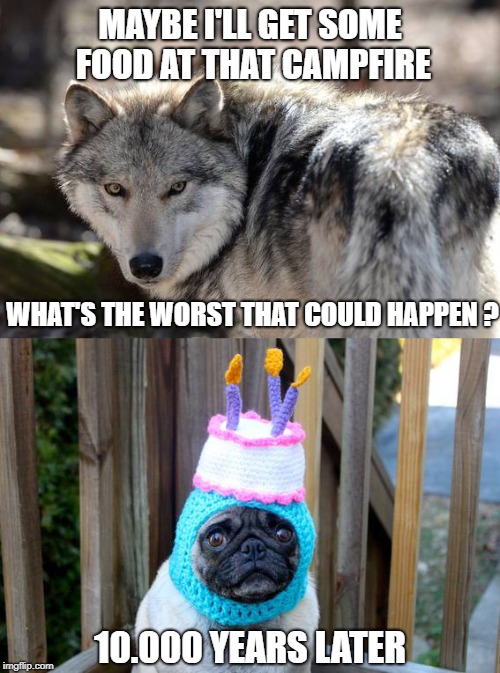Table of Contents
I have often argued that scientists and philosophers of the mind who turn to the great apes to compare with human minds are making a fundamental error. While the apes are genetically related to us, our evolutionary paths have diverged for millions of years. Millions of years in which apes and humans had little to do with each other.
On the other hand, one animal species has spent thousands of years drawing ever closer to us. To the point that a great many of us find ourselves inseparable from them.
A study of dog DNA has shown that our “best friend” in the animal world may also be our oldest one.
The analysis reveals that dog domestication can be traced back 11,000 years, to the end of the last Ice Age.
This confirms that dogs were domesticated before any other known species.
Dogs’ minds are in many ways remarkably like our own. Watching my dog attempting to play with the family cat, it’s clear that she cannot understand that he does not think like a dog. On the other hand, dogs manipulate their human companions shamelessly. Dogs get us, and we, them.
Dogs are clearly able to infer what humans are thinking (for instance, dogs will steal food they’ve been told to leave alone, as soon as there is no human around). Just how remarkable that is cannot be overstated.
The relationship between humans and dogs is one of the most remarkable in the animal kingdom.
Greger Larson, a co-author from the University of Oxford, said: “Dogs are our oldest and closest animal partner. Using DNA from ancient dogs is showing us just how far back our shared history goes and will ultimately help us understand when and where this deep relationship began”[…]
Dr Pontus Skoglund, co-author of the study and group leader of the Ancient Genomics laboratory at London’s Crick Institute, told BBC News: “Dogs are really unique in being this quite strange thing if you think about it, when all people were still hunter gatherers, they domesticate what is really a wild carnivore – wolves are pretty frightening in many parts of the world.
“The question of why did people do that? How did that come about? That’s what we’re ultimately interested in.”
There are two major theories of canine domestication. One is that humans deliberately sought out canine helpers. The other is that they sought out us: canine scavengers foraging for scraps around human camps gradually moved in. If so, then those ancient canines may have made one of the smartest evolutionary decisions in history.

What is clear, in any case, is that even in the geologically short timespan in which we’ve been co-habiting, humans have had a marked genetic effect on dogs. While, despite their remarkably diverse forms modern dogs are genetically identical enough to interbreed, dog DNA has altered remarkably from their wild ancestors. Unlike wolves, their probable ancestral brothers, dogs are able to digest starchy foods – an adaptation they appear to have made within the last 10,000 years, as we humans switched to farming and a starch-heavy diet.
As for our other common animal companions, some scientists argue that cats have never been truly domesticated. Our feline companions are really semi-wild predators who’ve deigned to put up with us in exchange for an easy food supply.

Whether this is true or not is no doubt as insolvable as “cat-person”, “dog-person” debates (indeed, even the term “domesticated” is remarkably difficult to properly define), but it seems undeniable that dogs are “just like us” in ways that no other animal seems to be.
If you enjoyed this BFD article please consider sharing it with your friends.









